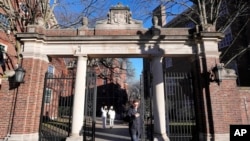Confidence in higher education among Americans is declining, according to a recent poll that found 36% of adults expressed a "great deal" or "quite a lot" of confidence in higher education, down from 57% in 2015.
The Gallup and the Lumina Foundation poll also revealed that more than two-thirds (68%) of adults feel the U.S. higher education system is heading in the “wrong direction” vs. 31% of those respondents saying it is going in the “right direction.”
The poll, conducted June 3-23, surveyed 1,005 Americans aged 18 and older.
Declining enrollment mirrors concerns voiced by some Americans about colleges focusing on political agendas, neglecting relevant skills and being overly expensive.
Nathan Wyand, a software engineer in Charlottesville, Virginia, told VOA News he chose not to attend college due to high costs and the challenging curriculum.
“The mode of learning was very stressful. Every month and a half, I would break down in tears,” Wyand said, adding, “I didn’t want to deal with the debt and lack of freedom in choosing what to learn.”
Post-high school, Wyand said he explored different jobs before pursuing software development through a 10-month data science bootcamp at Flatiron School in New York.
“I took online courses at Flatiron, learning about software development. In my current role, I have practical experience, though less theoretical knowledge than peers with computer science degrees,” Wyand noted.
Wyand valued freedom in learning over being told what to learn in a structured classroom.
“I didn't want other people to tell me what I was going to learn, I was tired of that and ready to take charge of my education,” he said.
While costs influenced Wyand’s decision against college, he advises against dismissing it solely due to expenses.
“Don’t avoid college because you’re lazy or because it’s expensive. Avoid college if you feel that there is something better or more interesting to you that you can pursue instead. It’s important to have an objective,” he said.
The survey conducted last month reaffirms that 36% of adults maintain strong confidence in higher education, unchanged from the previous year.
“At a time where the U.S. needs more skilled Americans to fulfill our labor market needs of today and tomorrow it is concerning to see that they are losing confidence that higher education can deliver what they need,” Courtney Brown, vice president at Lumina, an education nonprofit, told VOA News.
Researchers are concerned by fewer Americans expressing “some” confidence and more reporting of “very little” or “none.”
“This year’s findings show a notable increase in those with little to no confidence, now at 32%, compared to 10% in 2015. This trend is alarming and must be reversed,” Brown said.
Brown stressed the need to address concerns about perceived political influences and lack of relevant skills in higher education.
“Society must tackle college costs directly. Many find college unaffordable, leading to crippling debt. I do believe higher ed can transform and ensure it meets the needs of students, but to do so we must pay attention to these data and address these concerns head on – the stakes of not doing so are far too great for individuals, communities and our nation,” Brown added.
John Pollock, a recent graduate of Columbia College Chicago, told VOA he agrees with the poll’s findings.
“College is a business, not a guarantee for jobs or debt repayment. Many our age see multiple paths to success,” Pollock said. He added that networking opportunities are one value that colleges offer.
Of the roughly one-third of Americans who expressed a “great deal/quite a lot” of confidence in higher education, 27% said it is important for individuals and society to be educated.
Of the roughly one-third of Americans who said their confidence in higher education was “very little/none,” 41% cited colleges as being “too liberal,” or trying to “indoctrinate” or “brainwash” students as reasons for their replies.
Overall, 68% of respondents believe higher education is on the wrong track, contrasting with 31% who see it heading in the right direction.
Some information for this report came from The Associated Press.




